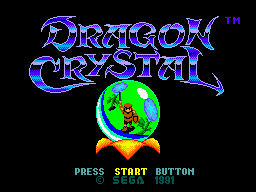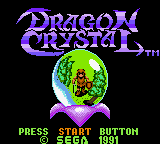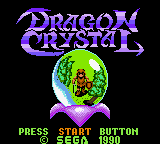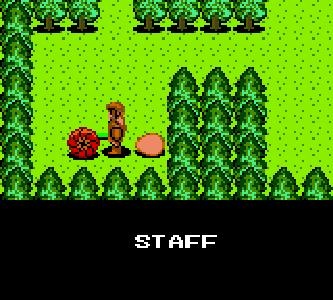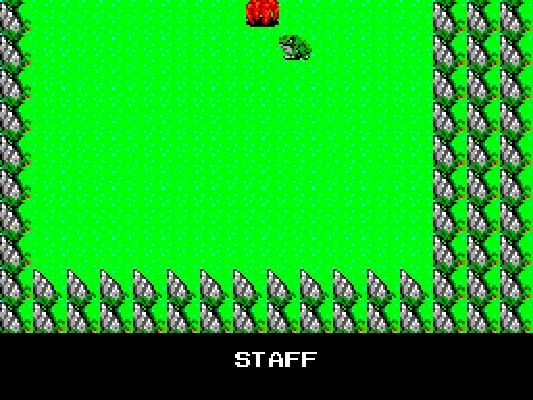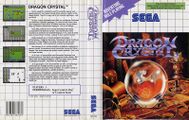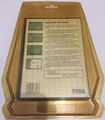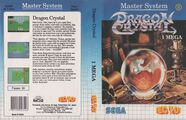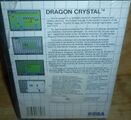Difference between revisions of "Dragon Crystal"
From Sega Retro
(story and gameplay from Wikipedia) |
|||
| Line 66: | Line 66: | ||
}} | }} | ||
{{stub}}'''''{{PAGENAME}}''''', known as '''''Dragon Crystal: Tsurani no Meikyu''''' (ドラゴンクリスタル ―ツラニの迷宮―) in Japan is a [[Sega Master System]] and [[Sega Game Gear]] roguelike. The gameplay and much of the graphics are shared with ''[[Fatal Labyrinth]]''. | {{stub}}'''''{{PAGENAME}}''''', known as '''''Dragon Crystal: Tsurani no Meikyu''''' (ドラゴンクリスタル ―ツラニの迷宮―) in Japan is a [[Sega Master System]] and [[Sega Game Gear]] roguelike. The gameplay and much of the graphics are shared with ''[[Fatal Labyrinth]]''. | ||
| + | |||
| + | ==Story== | ||
| + | As you ride a bicycle one late afternoon, you turn down an alley that you never before noticed and enter an antique shop. There, a mysterious glowing crystal is sitting on a shelf. Upon approaching the crystal and gazing into it, a powerful force pulls you in, causing a blackout. | ||
| + | |||
| + | You awaken in a forest with a large egg following behind. This forest is a huge maze, crawling with dangerous creatures. You find weapons and other items scattered around with which to fight the monsters. The only way out is to continue onward, defeating monsters and growing in power along the way. | ||
| + | |||
| + | ==Gameplay== | ||
| + | The game is a roguelike, which is a subgenre of role-playing games characterized by a dungeon crawl through procedurally generated levels. The hero awakens in the middle of a maze and must battle monsters through 30 randomly generated levels of increasing difficulty. At the end of each level but the last is an exit that leads to the next floor. The last level ends with the hero obtaining a holy goblet that frees him from the crystal. | ||
| + | |||
| + | The hero moves in any direction using the D-Pad; an egg follows him everywhere. In the Game Gear version, holding {{Start}} increases the hero's movement speed; in the Master System version, pressing {{Pause}} switches between slow and fast movement. The game is essentially turn-based, with each movement or action the equivalent to one turn. Monsters, which appear randomly, take turns with the hero exchanging attacks. This means that getting surrounded can be particularly dangerous as every enemy gets one attack for every one attack that the player gets. It also means that the player can pause a battle simply by waiting to make a move. Killing monsters increases the hero's experience. The hero gains a new level when he acquires enough experience, which increases his hit points. Hit points are traded in battle with the enemy but are recovered by moving around. The egg accompanying the hero hatches into a dragon that grows with him as he gains levels. Gold is used to revive from death, with the cost increasing with the number and severity of previous deaths. | ||
| + | |||
| + | Weapons, armor, potions, rings, food, and gold are randomly placed throughout the levels and can be picked up by pressing {{2}} when standing over them. The hero must regularly pick up food to avoid starving. Each food point allows the character to move six spaces on the screen. Bread gives 10 to 30 food points and meat gives 31 to 50 food points; the maximum number of food points is 99. | ||
| + | |||
| + | Items picked up in the game, with the exception of weapons and armor, are color-coded, with colors representing an effect that cannot be discovered until the player uses an item of that color or throws it on an enemy. Generally speaking, Pots are potions that can heal or poison the player, Books provide either maps or spells that may strengthen the player in some way or negate a harmful effect (such as removing cursed items), Rods cast spells that affect enemies, and Rings provide bonuses to stats (or sometimes are cursed, such as the Hunger Ring, which makes the player consume food much more quickly and requires a Bless Book to remove). The hero has a limited inventory. Unwanted items, such as armor or weapons weaker than the ones already worn by the player or cursed or poisonous items, can either be dropped or thrown at enemies for minor damage. The player can bring up a status screen for viewing and managing items by pressing {{1}}. | ||
| + | |||
| + | ==History== | ||
| + | ===Legacy=== | ||
| + | A ''[[Dragon Crystal II]]'' was planned for mobile phones but never released. | ||
| + | |||
| + | The Game Gear version of the game was released for the [[Nintendo 3DS]] [[Virtual Console]] in 2012. | ||
==Versions== | ==Versions== | ||
Revision as of 15:20, 19 March 2023
| Dragon Crystal | |||||||||||||||||||||||||||||||||||||||||||||||||||||||||||||||||||||||||||||||||||||||||
|---|---|---|---|---|---|---|---|---|---|---|---|---|---|---|---|---|---|---|---|---|---|---|---|---|---|---|---|---|---|---|---|---|---|---|---|---|---|---|---|---|---|---|---|---|---|---|---|---|---|---|---|---|---|---|---|---|---|---|---|---|---|---|---|---|---|---|---|---|---|---|---|---|---|---|---|---|---|---|---|---|---|---|---|---|---|---|---|---|---|
| System(s): Sega Game Gear, Sega Master System, Pocket PC, Virtual Console | |||||||||||||||||||||||||||||||||||||||||||||||||||||||||||||||||||||||||||||||||||||||||
| Publisher: Sega | |||||||||||||||||||||||||||||||||||||||||||||||||||||||||||||||||||||||||||||||||||||||||
| Developer: Sega R&D 2 Sanritsu[1] M2[2] | |||||||||||||||||||||||||||||||||||||||||||||||||||||||||||||||||||||||||||||||||||||||||
| Genre: RPG[3][4], Action[5], Adventure Role-Playing[6] | |||||||||||||||||||||||||||||||||||||||||||||||||||||||||||||||||||||||||||||||||||||||||
| Number of players: 1 | |||||||||||||||||||||||||||||||||||||||||||||||||||||||||||||||||||||||||||||||||||||||||
| Official in-game languages: | |||||||||||||||||||||||||||||||||||||||||||||||||||||||||||||||||||||||||||||||||||||||||
|
This short article is in need of work. You can help Sega Retro by adding to it.
Dragon Crystal, known as Dragon Crystal: Tsurani no Meikyu (ドラゴンクリスタル ―ツラニの迷宮―) in Japan is a Sega Master System and Sega Game Gear roguelike. The gameplay and much of the graphics are shared with Fatal Labyrinth.
Contents
Story
As you ride a bicycle one late afternoon, you turn down an alley that you never before noticed and enter an antique shop. There, a mysterious glowing crystal is sitting on a shelf. Upon approaching the crystal and gazing into it, a powerful force pulls you in, causing a blackout.
You awaken in a forest with a large egg following behind. This forest is a huge maze, crawling with dangerous creatures. You find weapons and other items scattered around with which to fight the monsters. The only way out is to continue onward, defeating monsters and growing in power along the way.
Gameplay
The game is a roguelike, which is a subgenre of role-playing games characterized by a dungeon crawl through procedurally generated levels. The hero awakens in the middle of a maze and must battle monsters through 30 randomly generated levels of increasing difficulty. At the end of each level but the last is an exit that leads to the next floor. The last level ends with the hero obtaining a holy goblet that frees him from the crystal.
The hero moves in any direction using the D-Pad; an egg follows him everywhere. In the Game Gear version, holding START increases the hero's movement speed; in the Master System version, pressing PAUSE switches between slow and fast movement. The game is essentially turn-based, with each movement or action the equivalent to one turn. Monsters, which appear randomly, take turns with the hero exchanging attacks. This means that getting surrounded can be particularly dangerous as every enemy gets one attack for every one attack that the player gets. It also means that the player can pause a battle simply by waiting to make a move. Killing monsters increases the hero's experience. The hero gains a new level when he acquires enough experience, which increases his hit points. Hit points are traded in battle with the enemy but are recovered by moving around. The egg accompanying the hero hatches into a dragon that grows with him as he gains levels. Gold is used to revive from death, with the cost increasing with the number and severity of previous deaths.
Weapons, armor, potions, rings, food, and gold are randomly placed throughout the levels and can be picked up by pressing ![]() when standing over them. The hero must regularly pick up food to avoid starving. Each food point allows the character to move six spaces on the screen. Bread gives 10 to 30 food points and meat gives 31 to 50 food points; the maximum number of food points is 99.
when standing over them. The hero must regularly pick up food to avoid starving. Each food point allows the character to move six spaces on the screen. Bread gives 10 to 30 food points and meat gives 31 to 50 food points; the maximum number of food points is 99.
Items picked up in the game, with the exception of weapons and armor, are color-coded, with colors representing an effect that cannot be discovered until the player uses an item of that color or throws it on an enemy. Generally speaking, Pots are potions that can heal or poison the player, Books provide either maps or spells that may strengthen the player in some way or negate a harmful effect (such as removing cursed items), Rods cast spells that affect enemies, and Rings provide bonuses to stats (or sometimes are cursed, such as the Hunger Ring, which makes the player consume food much more quickly and requires a Bless Book to remove). The hero has a limited inventory. Unwanted items, such as armor or weapons weaker than the ones already worn by the player or cursed or poisonous items, can either be dropped or thrown at enemies for minor damage. The player can bring up a status screen for viewing and managing items by pressing ![]() .
.
History
Legacy
A Dragon Crystal II was planned for mobile phones but never released.
The Game Gear version of the game was released for the Nintendo 3DS Virtual Console in 2012.
Versions
Localised names
| Language | Localised Name | English Translation |
|---|---|---|
| English | Dragon Crystal | Dragon Crystal |
| English (US) | Dragon Crystal | Dragon Crystal |
| Japanese | ドラゴンクリスタル ―ツラニの迷宮― | Dragon Crystal: Tsurani no Meikyu |
Production credits
Game Gear version
Master System version
Magazine articles
- Main article: Dragon Crystal/Magazine articles.
Promotional material
also published in:
- Mega Drive Fan (JP) #12: "January 1991" (1990-12-08)[20]
Artwork
Physical scans
Master System version
| Sega Retro Average | ||||||||||||||||||||||||||||||||||||||||||||||||||||||||||||||||
|---|---|---|---|---|---|---|---|---|---|---|---|---|---|---|---|---|---|---|---|---|---|---|---|---|---|---|---|---|---|---|---|---|---|---|---|---|---|---|---|---|---|---|---|---|---|---|---|---|---|---|---|---|---|---|---|---|---|---|---|---|---|---|---|---|
|
| 66 | |
|---|---|
| Based on 12 reviews | |
Game Gear version
| Sega Retro Average | ||||||||||||||||||||||||||||||||||||||||||||||||||||||||||||||||||||||||||||||||||||||||||||||
|---|---|---|---|---|---|---|---|---|---|---|---|---|---|---|---|---|---|---|---|---|---|---|---|---|---|---|---|---|---|---|---|---|---|---|---|---|---|---|---|---|---|---|---|---|---|---|---|---|---|---|---|---|---|---|---|---|---|---|---|---|---|---|---|---|---|---|---|---|---|---|---|---|---|---|---|---|---|---|---|---|---|---|---|---|---|---|---|---|---|---|---|---|---|---|
|
| 70 | |
|---|---|
| Based on 18 reviews | |
Technical information
ROM dump status
| System | Hash | Size | Build Date | Source | Comments | |||||||||
|---|---|---|---|---|---|---|---|---|---|---|---|---|---|---|
| ? |
|
128kB | Cartridge (EU) | |||||||||||
| ? |
|
128kB | Cartridge (JP) | |||||||||||
| ? |
|
128kB | Cartridge (US/EU) |
External links
References
- ↑ http://gdri.smspower.org/wiki/index.php/Sanritsu
- ↑ https://www.mtwo.co.jp/development/retrogame-2/#tab-4
- ↑ File:DragonCrystal GG JP Box Front.jpg
- ↑ 4.0 4.1 https://sega.jp/history/hard/gamegear/software.html (Wayback Machine: 2018-12-07 04:57)
- ↑ File:DragonCrystal GG EU Box Back.jpg
- ↑ File:DragonCrystal SMS EU Box.jpg
- ↑ Electronic Gaming Monthly, "April 1991" (US; 1991-xx-xx), page 29
- ↑ 8.0 8.1 8.2 Sega Power, "July 1991" (UK; 1991-06-06), page 20
- ↑ Computer & Video Games, "July 1991" (UK; 1991-06-15), page 97
- ↑ 10.0 10.1 Computer & Video Games, "November 1991" (UK; 1991-10-15), page 83
- ↑ http://www.segapda.com/gg/ggdetail?contentsID=SPDA9100000000209999 (Wayback Machine: 2003-08-11 08:01)
- ↑ 12.0 12.1 http://vc.sega.jp/3ds/crystal/ (Wayback Machine: 2018-03-23 23:11)
- ↑ 13.0 13.1 http://www.nintendo.com:80/games/detail/9RXBY2pwF8yA3KFlAzot_wUEEA_yOQ4F (Wayback Machine: 2012-03-09 00:01)
- ↑ 14.0 14.1 14.2 14.3 14.4 14.5 http://www.nintendolife.com/games/gamegear/dragon_crystal (Wayback Machine: 2017-06-24 20:56)
- ↑ https://www.nintendo.fr/Jeux/Console-virtuelle-Nintendo-3DS-/Dragon-Crystal--275572.html (archive.today)
- ↑ https://www.nintendo.co.uk/Games/Virtual-Console-Nintendo-3DS-/Dragon-Crystal--275572.html (archive.today)
- ↑ https://www.nintendo.de/Spiele/Virtual-Console-Nintendo-3DS-/Dragon-Crystal--275572.html (archive.today)
- ↑ File:Dragon Crystal GG credits.pdf
- ↑ File:Dragon Crystal SMS credits.pdf
- ↑ Mega Drive Fan, "January 1991" (JP; 1990-12-08), page 124
- ↑ Aktueller Software Markt, "Februar 1992" (DE; 1992-01-10), page 122
- ↑ Consoles +, "Février 1992" (FR; 1992-0x-xx), page 92
- ↑ Console XS, "June/July 1992" (UK; 1992-04-23), page 140
- ↑ Gamers, "Februar/März 1992" (DE; 1992-xx-xx), page 34
- ↑ Joypad, "Janvier 1992" (FR; 1991-12-1x), page 52
- ↑ Joystick, "Décembre 1991" (FR; 1991-1x-xx), page 125
- ↑ Mega Force, "Novembre 1991" (FR; 1991-11-19), page 86
- ↑ Mega Force, "Janvier 1992" (FR; 1992-01-15), page 83
- ↑ Player One, "Décembre 1991" (FR; 1991-xx-xx), page 94
- ↑ Play Time, "3/92" (DE; 1992-02-05), page 92
- ↑ Sega Pro, "April 1993" (UK; 1993-03-11), page 70
- ↑ Video Games, "1/92" (DE; 1992-02-03), page 36
- ↑ ACE, "August 1991" (UK; 1991-07-08), page 73
- ↑ Beep! MegaDrive, "February 1991" (JP; 1991-01-08), page 85
- ↑ Console XS, "June/July 1992" (UK; 1992-04-23), page 147
- ↑ Dragon, "Vol. XVI, No. 6: November 1991" (US; 1991-1x-xx), page 61
- ↑ GamePro, "June 1991" (US; 1991-xx-xx), page 58
- ↑ Games-X, "31st May 1991" (UK; 1991-05-24), page 36
- ↑ Génération 4, "Février 1991" (FR; 1991-xx-xx), page 110
- ↑ Hippon Super, "February 1991" (JP; 1991-01-07), page 43
- ↑ Hobby Consolas, "Noviembre 1991" (ES; 1991-1x-xx), page 38
- ↑ Joystick, "Février 1991" (FR; 1991-0x-xx), page 101
- ↑ Micromanía (segunda época), "Octubre 1991" (ES; 1991-xx-xx), page 36
- ↑ Mean Machines Sega, "October 1992" (UK; 1992-09-xx), page 143
- ↑ Raze, "September 1991" (UK; 1991-07-25), page 48
- ↑ Sega Power, "October 1991" (UK; 1991-09-05), page 61
- ↑ Sega Pro, "April 1993" (UK; 1993-03-11), page 74
- ↑ Sega Pro, "December 1991" (UK; 1991-11-21), page 47
- ↑ Sega Saturn Magazine, "September 1995" (JP; 1995-08-08), page 88
- ↑ Video Games, "3/91" (DE; 1991-09-06), page 81
| Dragon Crystal | |
|---|---|
|
Main page | Comparisons | Hidden content | Magazine articles | Reception | |
| Dragon Crystal series of games | |
|---|---|
| Dragon Crystal (1990) | |
| Dragon Crystal (1991) | |
| Dragon Crystal (2002) | |
| Dragon Crystal (2003) | Dragon Crystal II (2003) | |
| Dragon Crystal (2004) | Dragon Crystal II (2005) | |
| Dragon Crystal (2012) | |
- 1 player games
- JP Game Gear games
- All JP games
- US Game Gear games
- All US games
- EU Game Gear games
- All EU games
- UK Game Gear games
- All UK games
- Game Gear games
- 1990 Game Gear games
- All 1990 games
- Game Gear adventure games
- All adventure games
- EU Master System games
- PT Master System games
- All PT games
- UK Master System games
- AU Master System games
- All AU games
- MX Master System games
- All MX games
- BR Master System games
- All BR games
- Master System games
- 1991 Master System games
- All 1991 games
- Master System adventure games
- Pocket PC games
- JP Nintendo 3DS Virtual Console games
- US Nintendo 3DS Virtual Console games
- EU Nintendo 3DS Virtual Console games
- DE Nintendo 3DS Virtual Console games
- All DE games
- UK Nintendo 3DS Virtual Console games
- AU Nintendo 3DS Virtual Console games
- Nintendo 3DS games
- All 2012 games
- 2012 Nintendo 3DS games
- Nintendo 3DS Virtual Console games
- All games
- Stubs
- Old technical information
- Dragon Crystal
- Dragon Crystal (franchise)
